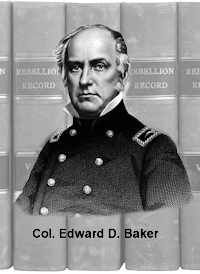March 23.—The battle of Winchester, Va., was fought this day. Yesterday afternoon the rebels, consisting of five hundred of Ashby’s cavalry and two guns, drove in the National pickets, and then skirmished with the Michigan cavalry and a portion of the Maryland First. Gen. Shields then brought up his forces and fired rounds of shell, drove them back, and took several prisoners. He was wounded in the arm by the first fire of the enemy. The Nationals slept on their arms at night. This morning, at sunrise, Jackson, being reenforced, attacked Gen. Shields near Kearnstown. The enemy’s force consisted of five hundred cavalry, five thousand infantry, and nine pieces of artillery, with a reserve of eighteen pieces. The fight was continued until noon, when a charge, made by one regiment of infantry and two of cavalry, on their right, drove them back half a mile, when they got their guns in position again in a dense wood, flanked by infantry, and drove the Union forces back. A short artillery duel ensued, when Gen. Shields ordered Col. Tyler to turn their left flank, which was executed with great loss, the enemy being protected by a stone-ledge. The Eighty-fourth Pennsylvania and Thirteenth Indiana charged their centre and the fight became general, with great massacre on both sides. Col. Murray, of the Eighty-fourth Pennsylvania, was killed. The enemy retired slowly, bringing their guns to bear at every opportunity. The Nationals rushed forward with yells, when a panic occurred among the enemy, and troops followed and drove them till dark, capturing three guns, three caissons, muskets, equipments, etc., innumerable, and bivouacked on the field. Gen. Williams, First brigade, Col. Donnelly, of the Twenty-eighth New-York, commanding, reenforced Gen. Shields’s forces. Gen. Banks, who was on the way to Washington when the battle occurred, returned and assumed command. In the mean time, Gen. Shields’s division, commanded by Col. Kimball, pursued the enemy beyond Newton, shelling them the whole distance. Jackson’s men were perfectly demoralized and could not be rallied. They threw overboard the dead and wounded to lighten the wagons. They confessed a loss of eight hundred and sixty-nine killed, wounded and missing. The National forces lost one hundred and fifteen killed and four hundred and fifty wounded.—(Doc. 103.)
—This morning the schooner Cora, prize to the United States gunboat Pinola, Lieut. Crosby commanding, arrived at Key West, Fla. The Cora was captured on the sixth inst, about one hundred miles south of Apalachicola, from which port she had escaped two days before, and is loaded with two hundred and eight bales of cotton. There was a most exciting chose before she was taken. Several shells were fired at her, and not until they burst between her masts did she condescend to heave to. She was commanded by Robert May, an Apalachicola pilot, and was brought here by Acting Master’s Mate D. C. Kells, of the United States brig Bohio, who was prizemaster of the schooner Eugenia Smith, and on his way as passenger on board the Pinola to rejoin his vessel when the Cora was captured.—National Intelligencer.
—The bodies of Col. Slocum, Major Ballou, and Capt. Tower, all of Pawtucket, R. I., recovered from the battle-field near Manassas, were placed on the cars this afternoon for transportation to Rhode Island.— (Doc. 104)
—The new Cabinet of President Davis was confirmed by the rebel Senate this morning, as follows:
Secretary of State, J. P. Benjamin, La.
Secretary of War, Geo. W. Randolph, Va.
Secretary of the Navy, S. R. Mallory, Fla.
Secretary of the Treatury, C. G. Memminger, S. C.
Attorney-General, Thomas H. Watts.
Pottmatter-General, Mr. Reagan, Texas.
—President Davis declared martial law over the counties of Elizabeth City, York, Warwick, Gloucester, and Matthews.—Norfolk Day-Book, March 24.
—Three hundred privates and fifty-eight officers, the first detachment of prisoners taken at Pea Ridge, arrived at St Louis, Mo.
—This day Gen. Parke’s brigade of Gen. Burnside’s division, took possession of Morehead City, N. C., finding it evacuated by the inhabitants. Lieut. Flagler, ordnance officer, and a member of Gen. Parke’s staff, crossed over to Fort Macon, a distance of two miles across Rogue’s Sound, with a flag of truce, and demanded a surrender. A considerable parley took place, in which the folly of the rebels attempting to hold out was set before them. The Fort was occupied by some five hundred secession troops, which were in command of Lieut. Smith. Lieut. Flagler assured them of the ample means at the disposal of the Nationals to reduce the Fort and deprecated the sacrifice of life which it would occasion. Lieut. Smith persisting in his refusal to surrender, Gen. Burnside at once commenced the operations of investment— N. Y. Commercial, April 3.
—A National force was sent to Nicholas Landing, sixty miles south of Savannah, Tenn., which seized fifteen hundred pounds of fresh pork and forty-five thousand pounds of cured hams and shoulders. For a long time this had been the mart for the pork business for the rebels.—N. Y. Commercial, March 29.



